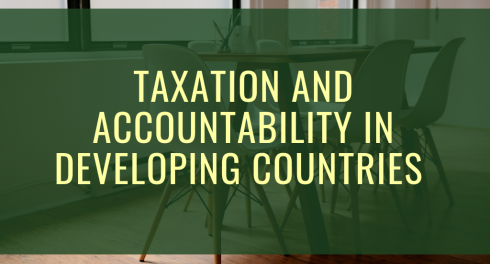The Open Society Foundations (OSF) and other donor members of the Transparency and Accountability Initiative (TAI) have long supported improved transparency and accountability in public finance around the globe. This has included efforts to foster transparency around the ultimate owners behind the anonymous shell companies that facilitate corruption, money-laundering, tax evasion, and other crimes. Given considerable progress in recent years on this topic of “beneficial ownership” (BO) transparency, including new mandates for BO information collection and disclosure in dozens of countries, OSF and TAI aim to improve donors’ and field actors’ understandings of how BO information is being accessed and used by key players involved in anti-corruption, anti-money laundering (AML), and domestic resource mobilization (DRM) efforts, as well as the implications of those use cases for future efforts on these topics. Given that TAI donors have substantial familiarity with some of the key user groups in the NGO and investigative journalists fields, we are particularly interested in clarifying use cases and practical issues related to professional users of BO information in the public and private sector — i.e. law enforcement, AML compliance officers, tax authorities, etc.
This consultancy will help inform the prioritization of needs and opportunities related to BO information within the context of larger anti-corruption, AML, and DRM goals. Products from this consultancy will be shared and discussed with fellow members of the TAI donor collaborative, as well as with key field actors such as OSF and TAI grantees working on these topics, as appropriate.
Context
There has been growing attention to secrecy around corporate ownership and how that has enabled corruption, illicit financial flows, money laundering, and tax evasion. Significant progress in combatting this trend has been made in recent years, including commitments to create public BO registers, building on the examples of Denmark and the UK. The European Union and Extractive Industries Transparency Initiative (EITI) both now require member countries to establish public beneficial ownership registries by 2020.
In many cases beneficial ownership information is not readily available internal to government, let alone publicly. In the US context, bipartisan legislation under consideration in both houses of Congress would address that gap. The Financial Action Task Force (FATF) recommendations 10, 24 and 25 on customer due diligence and transparency of legal persons and organizations, also help to address this information deficit and carry normative weight. While the FATF only has 37 members and limited enforcement mechanisms, the members comprise the biggest financial hubs. Accordingly, banks have invested significant resources in their due diligence to satisfy “know your customer” requirements.
Civil society groups have been active campaigners for BO registers and are actively tracking the creation of the registers, notably in the European Union. There are active efforts to demonstrate what can be done with the data and assess the quality and comprehensiveness of what is disclosed, such as the Global Witness briefing, Getting the UK’s House in Order. Civil society has also been attempting to provide guidance to countries to establish registers, most notably through OpenOwnership.
Despite civil society’s best efforts, they only have so much bandwidth (under existing funding commitments) and cannot effectively create detailed case studies of how existing BO registers are being used, for what purposes and to what effect. There also remains a collective need to gauge impacts of BO transparency efforts (or at least map out the feasibility of doing so), particularly for influential countries, such as Germany. This analysis will be important as the European Union reviews the implementation of its directive and as other jurisdictions consider the merits of creating registers. A more sophisticated understanding of the practical uses of beneficial ownership information in contributing to anti-corruption, anti-money laundering, and tax compliance/ DRM goals is also important for strategic prioritization of donors’ and field actors’ efforts in these areas.
Scope of work:
1) Identify data needs and uptake by priority users
For prioritized anticipated users of beneficial ownership information, starting in countries where data is available (either publicly or via special access by specific user groups, like law enforcement), the consultant will assess: (a) the extent to which those actors are using beneficial ownership information and for what purposes; (b) under what circumstances the information is useful (or not); (c) the means through which that information is accessed (not presupposing from public registers); and (c) how the availability/utility of beneficial ownership information could be increased to enable the governance/social good function of that user group (if at all).
For the purposes of this consultancy, priority will be given to assessing the BO information needs of:
- Law enforcement investigators, financial crime units
- Financial regulators
- Banking and private sector compliance officers
- Tax authorities
- Tax compliance experts (private sector)
- Procurement authorities
- Other potentially relevant user groups identified through research
In addition, the consultant will conduct a “lighter touch” verification of BO information needs and uses to date with a select number of investigative journalists and civil society groups in jurisdictions that have active registers.
For target users, the consultant should identify what policy (or other) remedies might better enable their access to and effective use of BO information: e.g., state-run registers with X or Y characteristics (i.e., public/ non-public access, ownership threshold, BO definition, verification regime, etc.); the establishment of stricter customer due diligence (CDD) requirements on service providers; access to related data sets; etc.
In clarifying information needs, the consultant should also seek user approaches for handling cross-border impacts. (I.e., given that shell companies in one country can cause negative impacts in another, having access to BO info in one’s home country may not be sufficient in pursuing legal enforcement. In this respect, there could be an important difference between public and non-public registers when it comes to cross-boundary access to the info.) In order to ensure geographic relevance, the consultant will work with OSF and TAI to identify interview subjects and case examples in select global financial hubs, global south countries, and (to the extent feasible) natural resource-rich countries.
2) Document impacts of use of BO information to date and the roles of different actors to generate those impacts
To the extent feasible, the consultant will identify examples of impacts from the use of BO information (via public registers or non-public sources) aligned to the user needs identified in 1).
The consultant will analyze for what purpose the information is proving useful (anti-corruption cases, pinpointing tax evasion, etc.), any actions taken for redress, the factors leading to uptake of the information, and the roles played by different stakeholders to the extent evident (e.g. are law enforcement or regulatory agencies taking actions based on information flagged by media or civil society groups).
This will include cases utilizing information from public registries (primarily Denmark, UK, and Ukraine as they were the first registries to be established) but need not be limited to those countries.
3) Advise on the potential to strengthen the documentation and aggregation of BO information uses on a more regularized basis
Building on the clarification of user needs for BO information and tracing of examples of use to date, the consultant should conclude with recommendations for funders (and, to the extent feasible, for advocacy groups in the field) as to the feasibility/value of ways to: (i) encourage more effective/impactful use of BO information for achieving anti-corruption, AML, and/or DRM objectives (with a particular focus on the role of professional users); and (ii) more effectively document the use of BO information and resulting impacts (including verifying the most effective types of BO registers).
We envisage the consultant will use a combination of desk research and interviews to complete these tasks.
Deliverables, Timeline, and Budget Envelope:
- Detailed inception note laying out proposed methodology for review with OSF and TAI – 2 weeks after contract signature
- Initial draft report (or separate documents for each component if more fit for purpose – up to 25 pages total) for OSF and TAI member comment – by October 15, 2019
- Final report for donors – by November 15, 2019
- 1-2 oral presentations of key findings and recommendations to OSF staff, other TAI donors and invited grantees – by November 30, 2019
- Blog capturing headline messages by November 30, 2019.
- Final report for public dissemination by December 6, 2019.
OSF is seeking proposals for under USD $25,000 for completion of all tasks.
Candidate profile
Successful candidates will bring:
- 10-15 years or more of relevant professional experience (ideally including experience working with one or more of the key professional user groups identified above)
- Experience working with civil society and government officials in multiple countries, including navigating cross-cultural and language issues
- Experience working on anti-corruption, tax and law enforcement issues
- Familiarity with beneficial ownership concepts
- Ability to work on a tight timeline, in dynamic consultation with OSF and TAI staff, and resourcefully drawing on additional outside expertise as needed to complete the work
- Excellent communication skills in English and ability to convey findings in a manner accessible to funder and practitioner audiences
Expressions of interest
Interested candidates should send a brief cover letter describing their interest in the work and the qualifications and experience they bring, alongside a CV and a brief outline of a proposed methodology and budget for undertaking the consultancy on the timeline identified. Please send all submissions of no more than six pages to [email protected] no later than July 15, 2019.
OSF will only follow up with candidates invited to the next round of selection.


